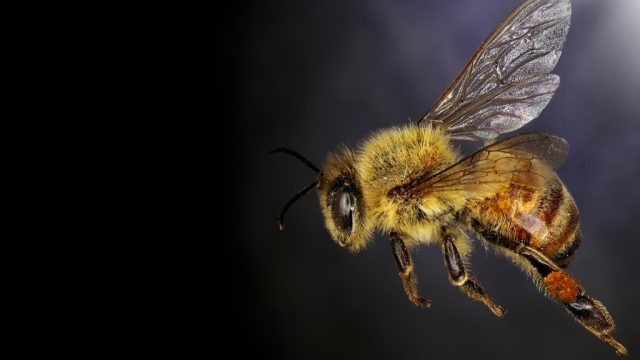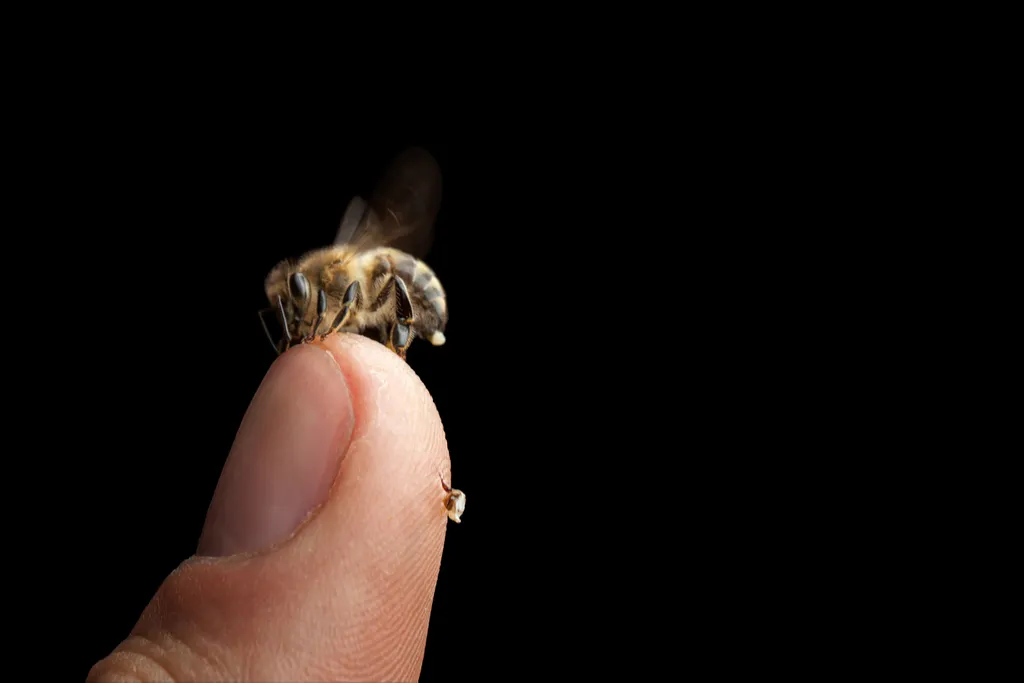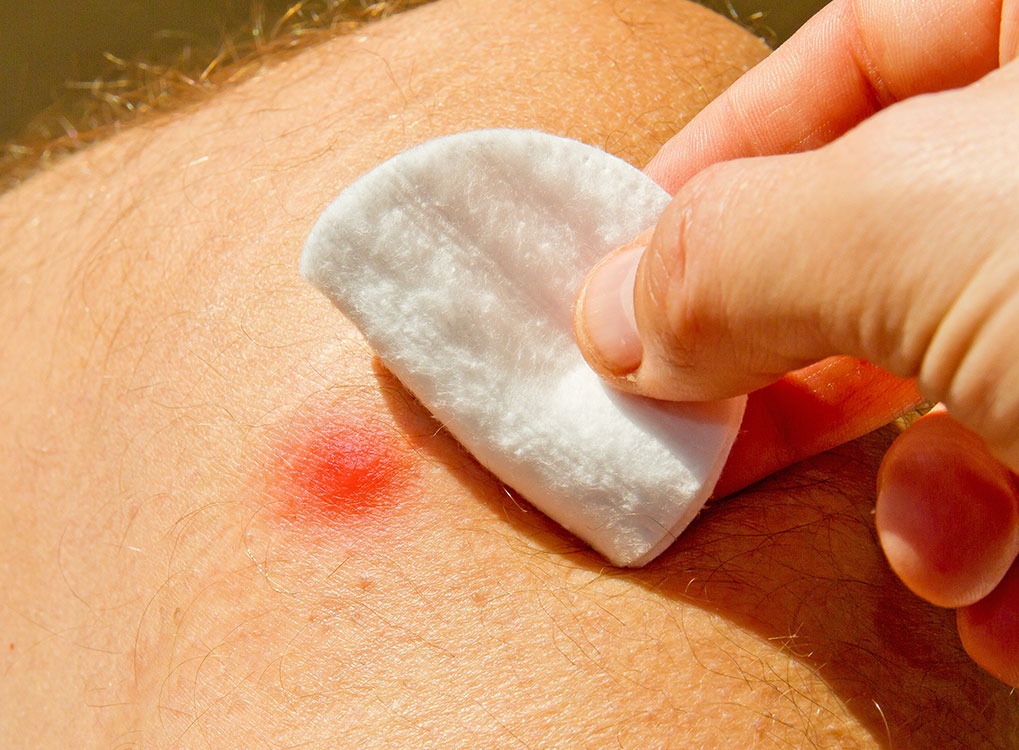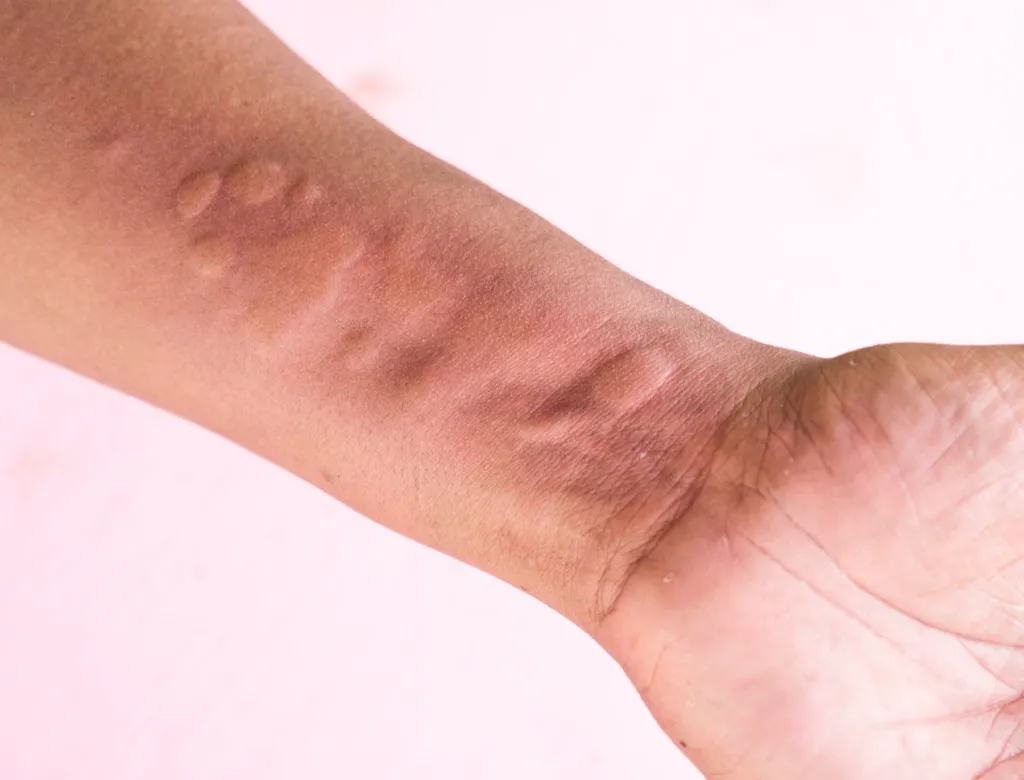This Is What Happens to Your Body When You Get Stung by a Bee

If you’ve ever been stung by a bee, you likely recall the nasty side effects that followed the sting—like the pain, redness, and swelling at the site of the attack. When we get a bee sting, our bodies do a whole lot of work to fight against the bee’s venom—and in nearly all cases, our immune systems provide an impeccable line of defense. (Only 90 to 100 individuals die every year from allergy-related bee sting complications, according to the Centers for Disease Control and Prevention.)
To peel back the curtain on the relentless systems that keep your body in check when you’re stung by a bee, check out the following steps that’ll make you feel just a bit safer the next time a bee flies your way.
Bee venom spreads immediately and quickly.

It’s important to understand that a bee’s venom is water-soluble, meaning that it dissolves in water. This proves to be bad news for humans, considering most of the human body is made of water—60 percent, to be exact—which therefore allows the venom to spread more quickly.
Your body’s white blood cells fight back.

After a bee sting, your body’s first line of defense comes in the form of white blood cells that arrive to fight off antigens in the bee’s venom, according to Wake Forest University’s Dr. Buddy Marterre, MD, who’s also a beekeeper. As this war wages on in your body, redness, swelling, heat, and pain may occur at the site of the sting.
The bee releases melittin into your body, which stimulates pain receptors.

Upon injecting its stinger into your skin, the bee releases a chemical called melittin into your body. Melittin is cytotoxic, which means that it destroys red blood cells immediately upon entering the body by breaking up their membranes, according to chemistry expert Suendues Noori of CurioCity.
On top of that, the melittin stimulates your body’s pain receptors. “It contributes to itching and swelling, and is the primary cause of the sting’s pain,” according to Marterre.
Your body releases histamine, causing swelling.

To help your immune system fight the spreading of venom, melittin triggers your body to produce histamine, according to the National Center of Biotechnology Information. This histamine helps your body fight off an infection, and it’s also what causes the swelling.
“Histamine dilates blood vessels, makes them leaky, and activates the endothelium (or lining of the capillaries). This leads to local edema (swelling), warmth, redness, and the attraction of other inflammatory cells to the site,” Marterre explains.
Your blood pressure drops.

With the bursting of the red blood cells at the site of the sting comes the eventual expansion of your blood vessels. This subsequently can cause your blood pressure to drop significantly, according to Marterre.
Your nerve tissue is damaged.

Three percent of bee venom is comprised of the protein apamin, which, when injected into your body, destroys nerve tissue. According to Marterre, apamin is “unique to bee venom and is a neurotoxin, [meaning] it is toxic to nerve conduction.”
Your kidneys work overtime.

Once a bee’s venom damages cell tissue in the body, it’s the kidney’s job to eliminate this damaged tissue in order to keep the body healthy and ready to face further traumas.
However, you shouldn’t worry about your renal function: The only time that the kidneys may be damaged from a bee sting is when the person affected is stung multiple times, as this can present an overabundance of damaged cell tissue for the kidneys to repair. Still, as a 2016 study published in the journal Annals of African Medicine notes that “acute renal failure (ARF) following bee stings is an uncommon complication.”
Your heart and adrenal glands are stimulated.

The proteins present in bee venom—including apamin and melittin—stimulate the heart and adrenal glands to work harder in order to push the infection out of your body, according to Mayo Clinic. In turn, this can cause your pulse to speed up.
The proteins also cause the adrenal glands to produce cortisol—that’s the hormone most commonly associated with stress—in order to protect the body from further infection.
Your immune system can overreact.

In the most serious and rare bee sting cases, the immune system can overreact to the sting, causing a life-threatening allergic response called anaphylaxis, according to the Mayo Clinic. Symptoms range from minor inconveniences (like hives and itching) to severe issues (like loss of consciousness).
You’re not in the clear for days.

Though delayed responses to bee stings are incredibly rare, they usually occur in those with a weak immune system, as the body’s defenses are not able to coordinate a proper response to the sting. “The reaction is sometimes delayed by as much as six days and therefore requires immediate transportation to an emergency room and hospitalization,” Marterre notes.
While symptoms of this delayed response vary, they range from inflammation of the brain, nerves, blood vessels, and kidneys, to the possibility of a serum sickness which can cause a rash, fever, or joint pain, according to Dr. Melissa Conrad Stöppler, MD. And for other signs to be wary of, here are 17 Allergy Symptoms You Need to Stop Ignoring.
To discover more amazing secrets about living your best life, click here to follow us on Instagram!